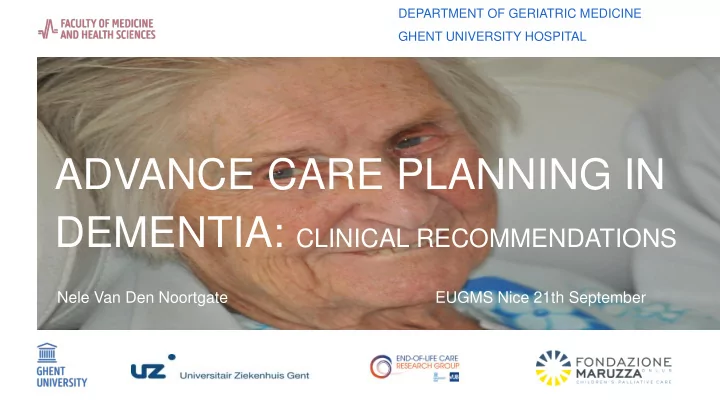

DEPARTMENT OF GERIATRIC MEDICINE GHENT UNIVERSITY HOSPITAL ADVANCE CARE PLANNING IN DEMENTIA: CLINICAL RECOMMENDATIONS Nele Van Den Noortgate EUGMS Nice 21th September
No conflict of interest to declare 2
CONTENT Background Methods Recommendations THOM’s
DEFINITION OF ACP ACP is the process by which patients, in conjunction with their physicians and loved ones, establish goals and preferences for future care, should he or she become incapable of participating in medical treatment decisions Smith et al. Arch Int Med 2006;166:1597-602. Tierney et al. J Gen Intern Med 2001;16:32-40
OUTCOME OF ACP IN PTS WITH DEMENTIA ̶ Better palliative outcomes ̶ Less tube feeding ̶ Fewer hospitalizations near the end of life ̶ Greater enrollment in palliative care Vandervoort et al. J Pain Symptom Manage 2014 5
SOME FIGURES OF ACP IN DEMENTIA 61% - 91% of older individuals wanted to discuss their end-of-life care Only 45% of pts with dementia had some communication regarding end-of-life care ̶ 16% about location of dying ̶ 11% appointed a surrogate decision maker ̶ 8% discussed medical treatment Sharp et al. Br J Gen Pract 2013; DOI:10.3399/bjgp13X673667 Meeussen et al. Int Psychogeriatr. 2012;24(10):1581-91. 6
̶ ̶ CHALLENGES OF ACP IN PTS WITH DEMENTIA ̶ Diagnosis Complex, uncertain in early stages ̶ Disease awareness ̶ Heterogeneity in trajectory of disease Affecting competency to make decisions 7
AIM To improve the prevalence, quality and consistency of ACP in people with dementia To develop clinical recommendations providing support for healthcare staff in community, residential and hospital settings 8
CONTENT Background Methods Recommendations THOM’s
METHODS 1. Extensive literature search ‒ Multidisciplinary group of authors ‒ Six clinical research domains were defined based on experiences and bottle necks in own practice Belgian Centre for EBM Cochrane (CEBAM) and ADAPTE procedures 10
METHODS: LITERATURE SEARCH 11
12
METHODS 1. Extensive literature search 2. Development of recommendations ‒ Based on available literature and expert opinion 3. Validation process ‒ Two peer review focus groups ‒ written feedback from experts ‒ online survey by target audience Belgian Centre for EBM Cochrane (CEBAM) and ADAPTE procedures 13
CONTENT Background Methods Recommendations THOM’s
32 RECOMMENDATIONS – 8 THEMES 1 Initiation of ACP (1c) 2 Evaluation of mental capacity (1c) 3 Performing ACP conversations (1c) 4 The role and importance of family (1b) 5 ACP when it is difficult or no longer possible to communicate verbally (1c) 6 Documentation of wishes and preferences, including information transfer (1b) 7 End-of-life decision-making (1c) 8 Preconditions for optimal implementation of ACP (1c) 15
1. INITIATION OF ACP ̶ Start ACP as early as possible ̶ Healthcare professionals should initiate ACP ̶ Integrate ACP into the daily care ̶ Adapt the communication style to the rhythm and level of the person ̶ Be alert for triggers and opportunities to start ACP and make use of any opportunity 16
̶ ̶ ̶ ̶ ̶ ̶ 1. INITIATION OF ACP ̶ Key moments may be the period around diagnosis while discussing the general care plan when changes occur in health status, place of residence Passing away of a loved person, another resident ̶ Don’t insist on ACP if there is no disease awareness if there is a clear indication that the person is not willing to discuss 17
2. ASSESSING MENTAL CAPACITY ̶ Mental capacity is ̶ fluctuating ̶ task -specific ̶ Assume maximal mental capacity ̶ Involve the person even in case of loss of capacity 18
̶ ̶ ̶ ̶ ̶ ̶ 2. ASSESSING MENTAL CAPACITY Formal clinical assessment should be considered In doubt or in case of disagreement When far-reaching consequences of decisions are expected Formal clinical assessment should include A broad neuro-psychological assessment An advice of a multidisciplinary team with expertise in dementia 19
̶ 3. THE ROLE OF FAMILY ̶ Involve as early as possible Also in case the person has still full mental capacity ̶ Evaluate disease awareness ̶ Inform about disease trajectory/ possible end-of-life decisions ̶ Inform about surrogate decision making and laws on legal representative (if available) 20
̶ ̶ ̶ ̶ ̶ ̶ ̶ 4. ACP WHEN COMMUNICATION IS NOT POSSIBLE Keep a connection with the person with dementia Respond to emotions Attend to non-verbal communication Observe behaviour to understand more about quality of life, fears and desires Ensure maximum participation of person with dementia Actively involve family or other close people Take into account the life-history, values, norms and wishes of patient with dementia 21
5. PRECONDITIONS FOR OPTIMAL IMPLEMENTATION ̶ Provide training for health care professionals ̶ Foresee adequate support ̶ Integrate ACP into mission statement and policy ̶ Embed ACP in organizational culture 22
CONTENT Background Methods Recommendations THOM’s
̶ ̶ ̶ ̶ ̶ ̶ ̶ ̶ TAKE HOME MESSAGE ACP is a process Actively involving the person with dementia and his family Discussing ‘best possible’ choices for future care In agreement with the life-history of the person Recommendations Want to support health care professionals in the process of ACP Are based on literature and multidisciplinary experience Require further evidence through high-quality research 24
THANKS TO PIERS Ruth ALBERS Gwenda Accepted for publication GILISSEN Joni in BMC pall care DE LEPELEIRE Jan STEYAERT Jan VAN MECHELEN Wouter STEEMAN Els DILLEN Let VANDEN BERGHE Paul VAN DEN BLOCK Lieve 25
2. ASSESSING MENTAL CAPACITY 27
Recommend
More recommend